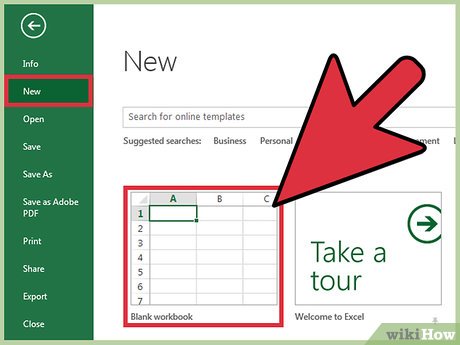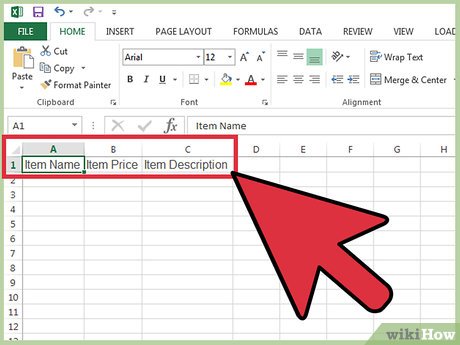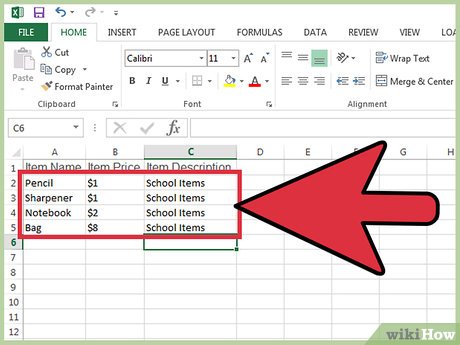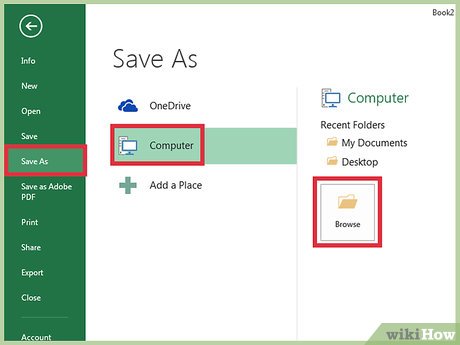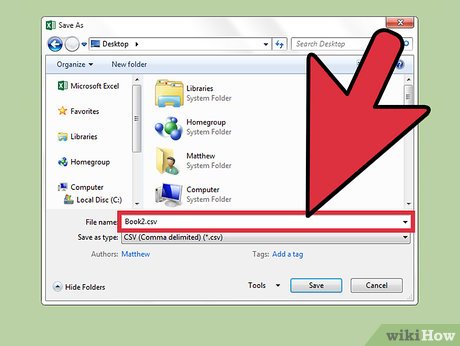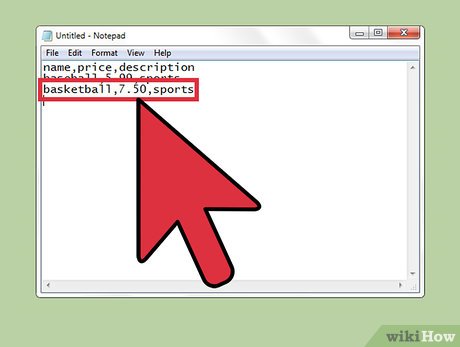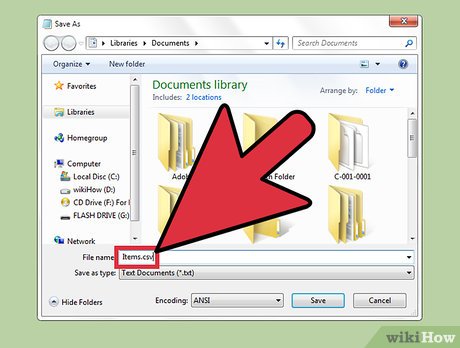How to Create a CSV File
Method 1 of 2:
Microsoft Excel, OpenOffice Calc, and Google Spreadsheets
-
 Open a new spreadsheet in Microsoft Excel, OpenOffice Calc, or Google Spreadsheets.
Open a new spreadsheet in Microsoft Excel, OpenOffice Calc, or Google Spreadsheets.- If you want to convert an existing spreadsheet to CSV format, skip to step #4.
-
 Type each of your headers, or field names into the cells located in row 1 at the top of the spreadsheet. For example, if entering data for items you're selling, type 'Item Name' into cell A1, 'Item Price' into cell B1, 'Item Description' into cell C1, and so on.[1]
Type each of your headers, or field names into the cells located in row 1 at the top of the spreadsheet. For example, if entering data for items you're selling, type 'Item Name' into cell A1, 'Item Price' into cell B1, 'Item Description' into cell C1, and so on.[1] -
 Enter your data into the spreadsheet under each column as needed. Using the example outlined in step #2, write the item name in cell A2, the item's price in cell B2, and the item's description in cell C2.
Enter your data into the spreadsheet under each column as needed. Using the example outlined in step #2, write the item name in cell A2, the item's price in cell B2, and the item's description in cell C2. -
 Click on 'File' and select 'Save As' after you've entered all data into the spreadsheet. If using Google Spreadsheets, this option will read as 'File > Download as.'[2]
Click on 'File' and select 'Save As' after you've entered all data into the spreadsheet. If using Google Spreadsheets, this option will read as 'File > Download as.'[2] -
 Select 'CSV' under the 'Save as type' dropdown menu.
Select 'CSV' under the 'Save as type' dropdown menu. -
 Type a name for your CSV file, then select 'Save.' You have now created a CSV file, and commas will automatically be added to the file to separate each field.[3]
Type a name for your CSV file, then select 'Save.' You have now created a CSV file, and commas will automatically be added to the file to separate each field.[3]
Method 2 of 2:
Notepad
-
 Launch Notepad and type your field names separated by commas onto the first line. For example, if entering data for items you're selling, type the following onto the first line: 'name,price,description.' There must be no spaces between items.
Launch Notepad and type your field names separated by commas onto the first line. For example, if entering data for items you're selling, type the following onto the first line: 'name,price,description.' There must be no spaces between items. -
 Type your data onto the second line, using the same format as your field names on the first line. Using the example outlined in step #1, write the actual item name, followed by the item's price and description. For example, if selling baseballs, write 'baseball,5.99,sports.'
Type your data onto the second line, using the same format as your field names on the first line. Using the example outlined in step #1, write the actual item name, followed by the item's price and description. For example, if selling baseballs, write 'baseball,5.99,sports.' -
 Continue typing your data for each individual item onto each subsequent line. If leaving any fields empty, make sure you include the comma, or the remaining fields will be off by one.
Continue typing your data for each individual item onto each subsequent line. If leaving any fields empty, make sure you include the comma, or the remaining fields will be off by one. -
 Click on 'File' and select 'Save.'
Click on 'File' and select 'Save.' -
 Type a name for your file and select '.csv' from the file extension dropdown menu.
Type a name for your file and select '.csv' from the file extension dropdown menu. -
 Click on 'Save.' You have now created a CSV file in Notepad.[4]
Click on 'Save.' You have now created a CSV file in Notepad.[4]
Share by
Isabella Humphrey
Update 05 March 2020
